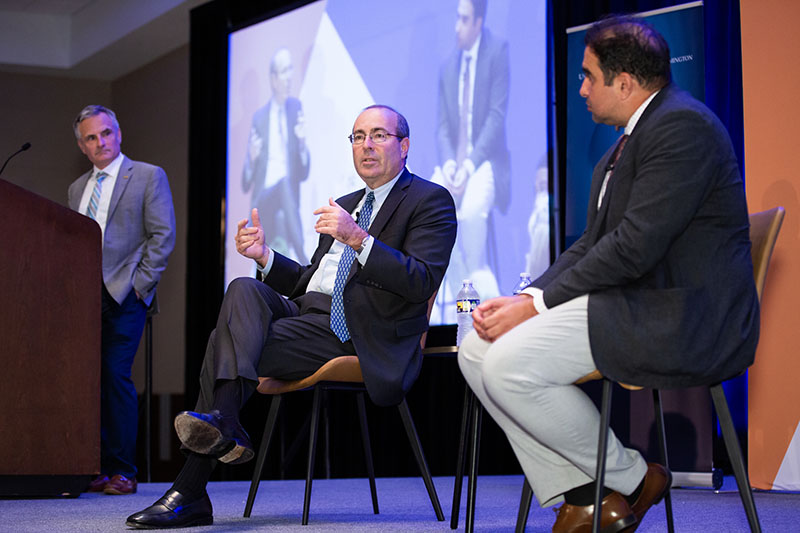Two top economists shared their views on the state of the economy in the Cape Fear region and beyond during the keynote address Thursday at the 2023 WilmingtonBiz Conference & Expo.
Tom Barkin, president and CEO of the Federal Reserve Bank in Richmond, highlighted the role of a changing labor market in determining the future of U.S. inflation. Meanwhile, Mouhcine Guettabi, an assistant professor of economics at the University of North Carolina at Wilmington, focused on recent economic shifts that could have continued impacts across the Cape Fear region.
The U.S. economy has broadly proven resilient In the face of rising inflation, Barkin said, with a relatively low unemployment rate and continued GDP growth.
“This growth has been in no small part due to the consumer who's continued to spend down pandemic-era savings, benefit from higher wages and also rising equity and house valuations,” Barkin said Thursday.
The next big question is where inflation goes from here, which is tough to answer, Barkin said.
“There are those who believe that inflation is going to settle further without much additional erosion of demand. There are those who believe the fight against inflation is going to require a more significant slowdown,” he said. “I believe that the answer to which of those two is the right path depends on what happens in the labor market.”
For many employers, the labor market remains out of balance with businesses struggling to fill worker shortages. The U.S. economy is seeing fewer people in the workforce. Some of that’s due to Baby Boomers aging out of the workforce, but the rest of the gap can be attributed to lower workforce participation rates for those "at or near retirement age,” Barkin said.
The COVID-19 pandemic has also contributed to shifts in attitudes among workers.
For example, more workers want the ability to work remotely while others have demanded higher wages or better working conditions. That’s forced employers to make changes by turning to apprenticeships to train new workers, improving their workspaces, raising pay, or even leaning into automation, Barkin said.
Looking to the future, the status of the economy will all depend on whether inflationary rates remain stable moving forward, Barkin said.
“It’s hard to know how all of this will balance out,” he said. “The range of potential outcomes to me is still pretty broad. I mean, you could articulate the case for a resurgence, you could articulate the case for a slowdown, you could articulate the case for turning to a pre-COVID economy.”
During the pandemic, the Wilmington area benefited in a big way from an influx of people and spending, said Guettabi, the UNCW professor and Wilmington’s regional economist. The area has especially benefited from an uptick in people migrating to the area from within the state along with those coming from New York, Virginia and California, among others.
“The migration story, to me, is a big deal because it feeds into labor market resilience … and it feeds into the spending story,” Guettabi said.
The Wilmington area has roughly 10,000 more jobs today than it did before the pandemic with wages rising faster than the rate of inflation, Guettabi said. Although the local labor market remains resilient, data shows that cracks could be forming with reductions among some sectors.
The region’s housing market remains in a standoff between buyers and sellers with buyers not wanting to sell their homes and buyers not wanting to purchase in the current economic climate.
Guettabi and other economists have struggled to determine when the “revenge spending” that took place during the pandemic will come to an end. During and after the pandemic, consumers spent money on experiences like travel and concerts along with other purchases to make up for time spent in lockdown.
Despite ongoing consumer spending, there could be signs it's ending, Guettabi said.
“There is a lot of evidence that says that the party potentially is coming to an end and that we're running out of runway when it comes to our experiences,” he said.




